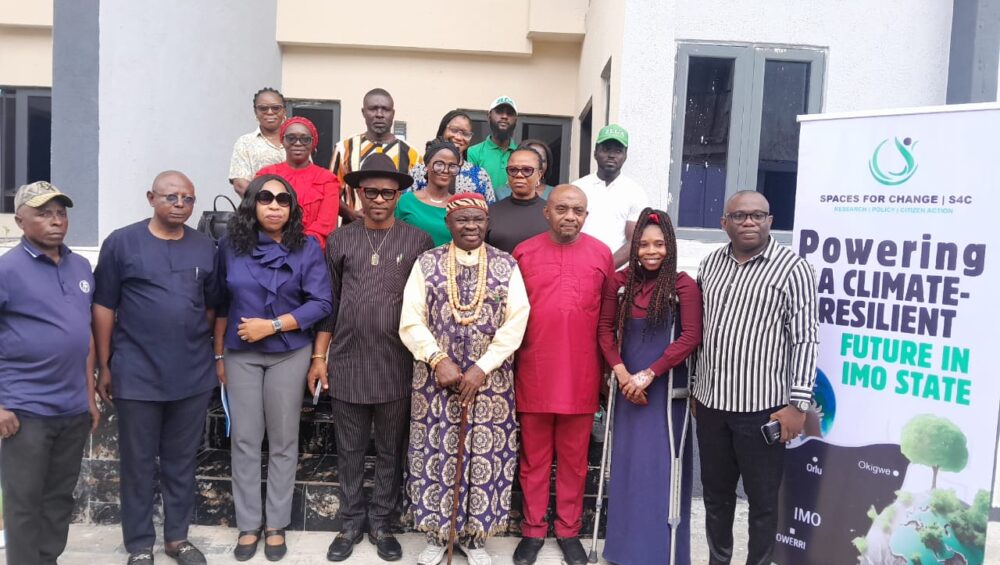As extreme weather conditions continue to upend lives across Nigeria, Imo State is emerging as a model of how subnational action can respond to the growing climate emergency. Year after year, communities in the state are devastated by flooding, gully erosion, excessive rainfall, and poor harvests—all directly tied to changing weather patterns. In 2024 alone, flooding displaced 7,832 people and affected over 60,000 others. In the capital, Owerri, studies now link 16 percent of erosion incidents to intensified rainfall.
Faced with this reality, Imo is not waiting for federal intervention. Instead, the state has launched a bold response: the development of its first-ever Climate Change Policy, spearheaded by the non-profit organization Spaces for Change (S4C) in partnership with the Imo State Ministry of Environment and Sanitation.
What began in July 2024 as an idea has grown into a full-fledged, participatory process that has brought together voices from across government, academia, traditional leadership, Person with Disabilities and grassroots communities. At the heart of the effort is the Imo State Technical Committee on Climate Change, a 16-member body inaugurated on October 18, 2024. Since then, the committee has worked tirelessly to develop a comprehensive and locally relevant legal framework that places people—not just policy—at the center of climate action.
At the close-out meeting of the committee, held in Owerri, Executive Director of Spaces for Change, Victoria Ibezim-Ohaeri, represented by Barr. Chetachi Louis-Udeh, praised the stakeholders for their commitment, describing the journey as a collaborative force rooted in shared purpose.
“From interstate peer learning to technical deliberations, public awareness activities, and stakeholder town halls, your work has consistently reflected a deep understanding of the urgency of climate change and the need for locally-driven, people-centered solutions,” she said.
The drafting process formally began with a climate policy session on January 21, 2025, where technical experts, community leaders, and legislators laid the foundation for the law. The goal was not to replicate the federal National Climate Change Act of 2021 but to adapt its strengths to the specific environmental challenges and realities facing Imo communities.
This has meant identifying how climate change is disrupting food systems in rural areas like Ideato, Njaba, Nwangele, and Oguta, and what kind of solutions small-scale hydropower, wind energy, improved drainage systems, or climate-smart farming can best protect lives and livelihoods.
Speaking at the event, the Imo State Commissioner for Environment and Sanitation, Barrister Ejikeme Major Emenike, represented by the Permanent Secretary, Chukwuma Ihenacho described the initiative as a roadmap to sustainability. He affirmed the ministry’s commitment to ensuring the policy is passed into law and implemented, applauding Spaces for Change and its partners for the work done in pushing the state toward climate readiness.
Chairman of the Imo House of Assembly Committee on Environment, Hon. Innocent Ikpamezie, also commended the effort, noting that despite financial constraints, Spaces for Change and its partners carried all the of the financial responsibility for the entire policy process.
“This effort will not go unrecognized,” he said. “We will ensure the draft policy is passed into law and upheld across the state.”
The collaboration has been remarkable not only for its technical depth but for its inclusiveness. From traditional leaders to female representatives of rural communities, every voice was given space at the table. The result is a draft policy that reflects local realities, community needs, and a long-term vision for climate justice in Imo.
Spaces for Change is not walking away at the end of this policy phase. The organization has pledged to continue supporting the implementation process—ensuring that the shift from policy to action is just as participatory and transparent as the drafting stage.
While the road to resilience is long, Imo State has shown what is possible when political will, civil society, and local communities come together. At a time when many states remain silent on climate policy, Imo is not only speaking out—it is building a future where climate resilience is not a dream but a clear and achievable goal.





